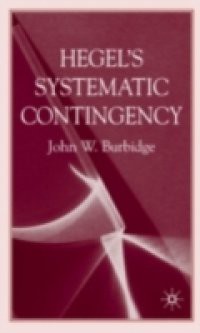When Hegel says that historical development is stimulated and maintained by the human passions, he is placing contingency at the heart of his understanding of the world. Indeed, a careful analysis of his discussion of Actuality shows that contingency is absolutely necessary. From this perspective, one discovers in his Phenomenology of Spirit an extended description of the way confident expections are confounded by experience.In Hegel's Systematic Contingency John Burbidge shows how this affects the systematic structure of the Science of Logic and its relation to the Philosophy of Nature (chemistry and biology) and the Philosophy of Spirit (psychology and history). In conclusion he explores what this understanding of Hegel's thought would involve if applied to some developments of modern science. Despite the tradition that at the centre of Hegel's system is an entity called "the Absolute", Burbidge shows that absolute knowing involves expecting that ones knowledge claims will be confounded by experience, that the method of pure thinking confronts unanticipated distinctions and new insights, and that the cosmic life of the universe is characterized by pure intention, action that creates new realities, and the comprehensive ability to understand how it all, nevertheless, fits together into a coherent pattern.

